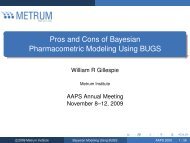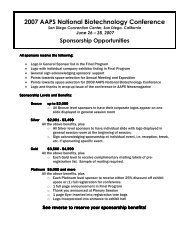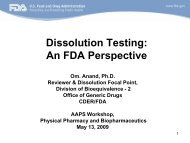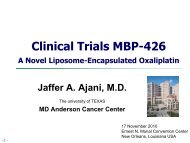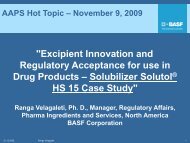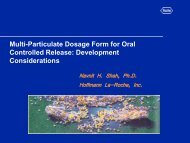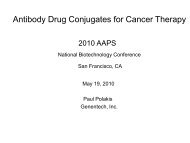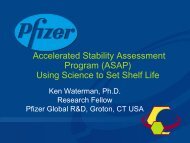Preliminary Program - American Association of Pharmaceutical ...
Preliminary Program - American Association of Pharmaceutical ...
Preliminary Program - American Association of Pharmaceutical ...
You also want an ePaper? Increase the reach of your titles
YUMPU automatically turns print PDFs into web optimized ePapers that Google loves.
72<br />
2009 AAPS Annual Meeting and Exposition<br />
AAPS Pharmacokinetics, Pharmacodynamics and Drug Metabolism (PPDM) <strong>Program</strong>ming<br />
9:00 am – 11:00 am<br />
Translational Challenges in PK/PD/TD<br />
<strong>of</strong> Biotechnology-derived Products<br />
Roundtable<br />
The unique complexities associated with the PK<br />
and PK/PD <strong>of</strong> biotechnology-derived products<br />
including immunogenicity, species specificities,<br />
and target/immune-mediated clearance pose<br />
special challenges in translation <strong>of</strong> PK/PD/TD from<br />
preclinical to clinical domain. In preclinical safety<br />
assessment, a loss <strong>of</strong> exposure <strong>of</strong> humanized<br />
antibody due to neutralizing immune response<br />
may prevent appropriate end-organ toxicity or<br />
safety margin estimation and may not have human<br />
relevance. Translation <strong>of</strong> safety biomarkers from<br />
early to late stage <strong>of</strong> clinical development.<br />
Moderator<br />
Anis A. Khan, Ph.D.<br />
Merck & Co, Inc.<br />
PK/PD Translational Issues with Biologics<br />
Anis A. Khan, Ph.D.<br />
Merck & Co, Inc.<br />
Translation <strong>of</strong> Safety Biomarkers from Early to<br />
Late Stage <strong>of</strong> Clinical Development<br />
Joy A. Cavagnaro, Ph.D., D.A.B.T., R.A.C<br />
AccessBio<br />
WEDNESDAY AFTERNOON ROUNDTABLES<br />
2:00 pm – 4:00 pm<br />
In Vivo Animal Models for Prediction <strong>of</strong><br />
Drug-drug Interactions<br />
Roundtable<br />
With the advent <strong>of</strong> polytherapy it has become<br />
prudent to minimize, as much as possible, the<br />
potential for drug-drug interactions. Conducting<br />
drug-drug interaction studies is expensive and there<br />
is great emphasis to proactively minimize potential<br />
for drug-drug interactions. Towards this end, the<br />
metabolic and transporter pathways involved in the<br />
disposition <strong>of</strong> a drug candidate (phenotyping) are<br />
evaluated in vitro employing available human tissue<br />
and specific reagents. Likewise, in vitro screening<br />
for inhibition and induction <strong>of</strong> drug-metabolizing<br />
enzymes and transporters is conducted also. Such<br />
in vitro human data can be made available prior to<br />
human dosing and enable in vitro to in vivo-based<br />
predictions <strong>of</strong> clinical outcomes. Despite some<br />
success, however, in vitro systems are not dynamic<br />
and sometimes fail to predict drug-drug interactions<br />
for a variety <strong>of</strong> reasons. In comparison, relatively<br />
less effort has been made to evaluate predictions<br />
based on data derived from in vivo animal models.<br />
The focus <strong>of</strong> this roundtable is to provide examples<br />
where animal models can be used to predict<br />
cytochrome P450-and transporter-based drug-drug<br />
interactions. Following brief presentations, there<br />
will be discussion surrounding caveats in employing<br />
these animal models and their utility in conjunction<br />
with in vitro-in vivo extrapolation methods. Such<br />
an integrated data set can be used to select drug<br />
candidates with a reduced drug interaction potential.<br />
Moderator<br />
Punit H. Marathe, Ph.D.<br />
Bristol-Myers Squibb<br />
In Vivo Animal Models for Prediction <strong>of</strong> CYP<br />
Inhibition-mediated Drug-drug Interactions<br />
Cuyue Tang, Ph.D.<br />
Merck and Co., Inc.<br />
In Vivo Animal Models for Prediction <strong>of</strong> CYP<br />
Induction-mediated Drug-drug Interactions<br />
Michael Sinz, Ph.D.<br />
Bristol-Myers Squibb<br />
In Vivo Animal Models for Prediction <strong>of</strong><br />
Transporter-mediated Drug-drug Interactions<br />
Gary Bowers, Ph.D.<br />
GlaxoSmithKline plc<br />
WEDNESDAY AFTERNOON SYMPOSIA<br />
funded by a grant from<br />
2:00 pm – 4:30 pm<br />
Mechanism-based PKPD Modeling: Its<br />
Role in Discovery and Early Development<br />
<strong>of</strong> Biologics<br />
Symposium<br />
Pharmacokinetic-Pharmacodynamic (PKPD)<br />
modeling is being increasingly applied early on in<br />
the discovery and development <strong>of</strong> all therapeutics.<br />
This technology has even higher relevance for<br />
biologics such as antibodies, because <strong>of</strong> their<br />
unique PKPD properties. The increase in computing<br />
power and higher resolution in analytical techniques<br />
for measuring cellular reactions has prompted<br />
increased confidence in in silico approaches such<br />
as computational systems biology in the design<br />
<strong>of</strong> therapeutics with optimal PKPD properties. The<br />
regulatory environment has also changed in recent<br />
years and PKPD modeling using preclinical data may<br />
be required to support first-in-human trial designs<br />
for “high-risk” biologics such as some antibodies.<br />
This symposium will discuss the importance<br />
<strong>of</strong> early investment in a PKPD modeling and<br />
simulation platform, discovery through preclinical<br />
development, and support the optimal progress <strong>of</strong><br />
biologic programs.<br />
Moderators<br />
Ellen Q. Wang, Ph.D.<br />
Pfizer Global Research & Development<br />
Joseph P. Balthasar, Ph.D.<br />
University at Buffalo, The State University<br />
<strong>of</strong> New York<br />
Integration Not Isolation: The Role <strong>of</strong><br />
Computational Systems Biology on the<br />
Discovery <strong>of</strong> Antibody Therapeutics<br />
John Burke, Ph.D.<br />
Boehringer Ingelheim <strong>Pharmaceutical</strong>s, Inc.<br />
PKPD Modeling <strong>of</strong> Preclinical Data Using a<br />
Surrogate Antibody to Underwrite Reprotoxicology<br />
Safety<br />
Saileta Prabhu, Ph.D.<br />
Genentech, Inc.<br />
PKPD vs. Toxicology-based Approach to<br />
Starting Dose Selection in First-in-Human<br />
Trials<br />
Balaji M. Agoram, Ph.D.<br />
Pfizer Global Research & Development<br />
Application <strong>of</strong> Mechanistic PKPD Modeling for<br />
Predicting Human PKPD Response<br />
Philip Lowe, Ph.D.<br />
Novartis Pharma AG<br />
2:00 pm – 4:30 pm<br />
Microdialysis Role in the Development<br />
and Optimization <strong>of</strong> Drug Topical<br />
Delivery<br />
Symposium<br />
The rapid and efficient development and evaluation<br />
<strong>of</strong> topical delivery systems is still a challenge,<br />
particularly when new approaches or devices<br />
like iontophoresis are tested. In vivo cutaneous<br />
microdialysis allows studying drug delivery and<br />
pharmacokinetics as close as possible to the site <strong>of</strong><br />
action and provides a tremendous tool for a better<br />
understanding <strong>of</strong> how the formulation affects drug<br />
PK into the skin. The proposed symposium will start<br />
with an overview <strong>of</strong> the microdialysis technique<br />
as applied to skin issues and will compare it with<br />
the other methods used to study PK in skin or<br />
skin layers. Then some <strong>of</strong> the available studies<br />
that utilized MD in skin will be presented and<br />
discussed. An expert from the U.S. Food and Drug<br />
Administration (FDA) will also be invited to provide<br />
insights into the regulatory aspects <strong>of</strong> the technique.<br />
The symposium will provide the attendee with the<br />
opportunity to evaluate the contribution <strong>of</strong> MD to<br />
improve our understanding <strong>of</strong> skin delivery.<br />
Moderators<br />
Carryn Purdon, Ph.D.<br />
Nycomed<br />
Chinmay Shukla, Ph.D.<br />
U.S. Food and Drug Administration







